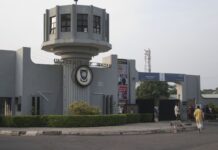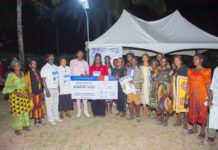Joe Parkinson and Drew Hinshaw
Seven years ago, the Islamist insurgent group Boko Haram kidnapped 276 teenage girls from Chibok, Nigeria, on the eve of their graduating exams. They were, within weeks, an international cause celebre, with millions (including Ellen DeGeneres, the Rock, the pope and Michelle Obama) tweeting calls for their freedom with the hashtag #BringBackOurGirls. The inevitable backlash held that tweets are a lazy and ineffective way to seek social change. This was not activism, critics said, but “slacktivism,” and it would make no difference in the offline universe. Ann Coulter mocked the hashtag as trivial posturing. “This is not intended to have any effect on the real world,” George Will told a Fox News panel. “Terrorists don’t read Twitter,” Sean Hannity assured Fox News viewers.
Deputy national security adviser Ben Rhodes, discussing the metrics during a meeting in the White House Situation Room, expressed bewilderment over what impact the hashtag could have: “Even if it hits a billion tweets, do we think Boko Haram is going to throw up their hands and say, ‘Okay, we let the girls go’?”
Just as the cynics predicted, the crowd soon moved on. The next viral cause, the Ice Bucket Challenge, quickly replaced #BringBackOurGirls.
Yet the critics were wrong in saying that a worldwide hashtag campaign would have no impact. For the past seven years, we’ve reported out a book project, “Bring Back Our Girls,” disentangling the ways that a few days’ worth of tweets managed to transform a war that continues to rage in Africa’s most populous nation. Before the hashtag, the main effort to free the Chibok girls consisted of a few dozen dads revving motorbikes down a lonesome dirt road, carrying a handful of crumpled bank notes to buy the freedom of daughters they ultimately failed to locate. Nigeria, fighting a years-long war with Boko Haram, was on its own.
After the hashtag, seven foreign nations poured billions of dollars — in drones, intelligence officers, satellite coverage, special forces, FBI agents, CIA officers and eventually foreign mercenaries — into a four-country search zone to free a group of ordinary teenagers transformed by social media into a central prize in America’s global war on terror. Boko Haram became an internationally known entity and soon forged an alliance with the Islamic State. An economy of ransoming schoolchildren emerged, and Nigeria has seen five mass abductions totaling almost 1,000 students in the past year.
It turns out that hashtag activism — “slacktivism,” if you prefer — is effective. Just not always in the ways that people who practice it intend.
Other hashtags derided as slacktivism have had similarly lasting impact. A week-long viral campaign in 2012, #StopKony, pushed Washington to reinvigorate a barely known military hunt for Uganda’s Joseph Kony, a warlord whose Lord’s Resistance Army forcibly recruited children as fighters. During Arab Spring uprisings, hashtags like #Egypt, #Libya and #GeziPark, in Turkey, became rallying points for protesters on the streets but also shifted Western policy toward longtime counterterrorism allies in Cairo and Ankara. NATO war planners later admitted that they used tweets to pinpoint airstrikes against Moammar Gaddafi’s forces.
In the White House in April 2014, quickly thumbed-out tweets tagged #BringBackOurGirls were compiled by the National Security Council into emails sent to top Obama administration officials, who then plotted a military intervention in the same Situation Room complex where they had watched the assassination of Osama bin Laden. To the State Department, too, the hashtag represented a chance to dispatch military power for humanitarian ends. “What if these were our daughters?” a senior department official asked Secretary of State John Kerry, whose own daughter had discussed the campaign with him by phone. After a series of meetings, the administration agreed to deploy spy planes, Air Force personnel, and Global Hawk and Predator drones to help find the girls, and dispatched a team of nearly 40 intelligence officers, law enforcement specialists and diplomats to lead the hunt.
Nigeria, previously reluctant to open up its soil to such foreign intervention, agreed, under public pressure. Other nations joined the hashtag-inspired mission. Britain sent a surveillance plane, France dispatched intelligence officers to Nigeria’s borders with three former French colonies, Israel offered intelligence, Canada sent special forces, and China promised satellite imagery. Later, a South African mercenary company led by former apartheid-era commandos was enlisted to help the girls, joining the fray along with Chadian special forces.
Still, none of those foreign powers managed to free a single girl.
Instead, the rescue mission launched in 2014 quietly evolved into a Western military deployment across four West African countries, where hundreds of U.S. troops remain to this day. Nigeria’s military, American diplomats and terrorism specialists still express amazement that a short-lived Twitter trend so profoundly shaped the conflict with Boko Haram and other jihadist groups — which continue to kidnap children, hoping to replicate the multimillion-euro ransom that ultimately freed 103 of the Chibok girls in two exchanges in 2016 and 2017.
Then there was the life-changing impact on the girls themselves: 276 students who’d been studying, sleeping or singing hymns in their dormitories entered captivity as anonymous statistics in a horrific war. Without their knowledge, they became the world’s most famous hostages. None of them had ever heard of Twitter, and for the duration of their captivity, few were aware of the global campaign waged on their behalf. Yet by the end of their first month in captivity, their hashtag fame had lifted their value to Boko Haram. “What the girls mean to Boko Haram is what 9/11 meant to Osama bin Laden,” said one of the mediators who helped organize talks to release the girls. “The hashtag made Boko Haram into a household name.”
Fame also made it possible for some to resist. Increasingly aware of their special status, thanks to comments from their guards, the students began whispering prayers together in their prison, and for months they kept secret diaries. From a Bible they buried or hid under their clothes, they copied passages about Mary, or the Book of Job, and they jotted Psalms into the same notebooks where they recorded the horrifying details of their abduction alongside pop lyrics and letters to their crushes at school or their parents at home. Boko Haram repeatedly threatened to execute them, but because the hashtag had turned them into its most valuable commodity, the fighters never followed through. One of the students, Naomi Adamu, kept three of the diaries tied to her leg for three years, a firsthand record of the women’s ordeal that she successfully smuggled to freedom. “We wanted the world to see what we witnessed,” Naomi said.
Today, some 112 Chibok students remain unaccounted for. After 12 years of war with Boko Haram, 23,992 Nigerians are registered as missing with the Red Cross, the agency’s highest such toll on Earth. To liberate just 103 of the Chibok students took years of secret hostage talks, organized by a Swiss diplomat and a band of Nigerian volunteers so discreet that they communicated using an encrypted fax machine and frequently snuck into insurgent territory via motorbike. One of the mediators spent a year in jail, imprisoned after holding phone calls with Boko Haram, a group most officials found it easier to condemn than to understand.
Ultimately, the deal that freed the 103 students involved releasing five Boko Haram members from jail and paying a 3 million euro ransom. That cash windfall, delivered in a black zip-up backpack, poses an ethical quandary for the Nigerian state but also for the millions of Americans who joined a morally straightforward cause whose outcomes became far more complicated. #BringBackOurGirls began as a story about a remote, tragedy-stricken town in Nigeria, yet with a click of the mouse, it evolved into a parable, and perhaps a cautionary tale, about good intentions and unintended consequences.
The young women are working on making sense of it themselves. Those released were offered full scholarships to Nigeria’s American University in the city of Yola, where one afternoon, during their first year of freedom, a group of the students joined a debate club to argue both sides of a question they could answer from personal experience: Is social media a force for good?
*Culled from www.washingtonpost.com





























































